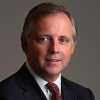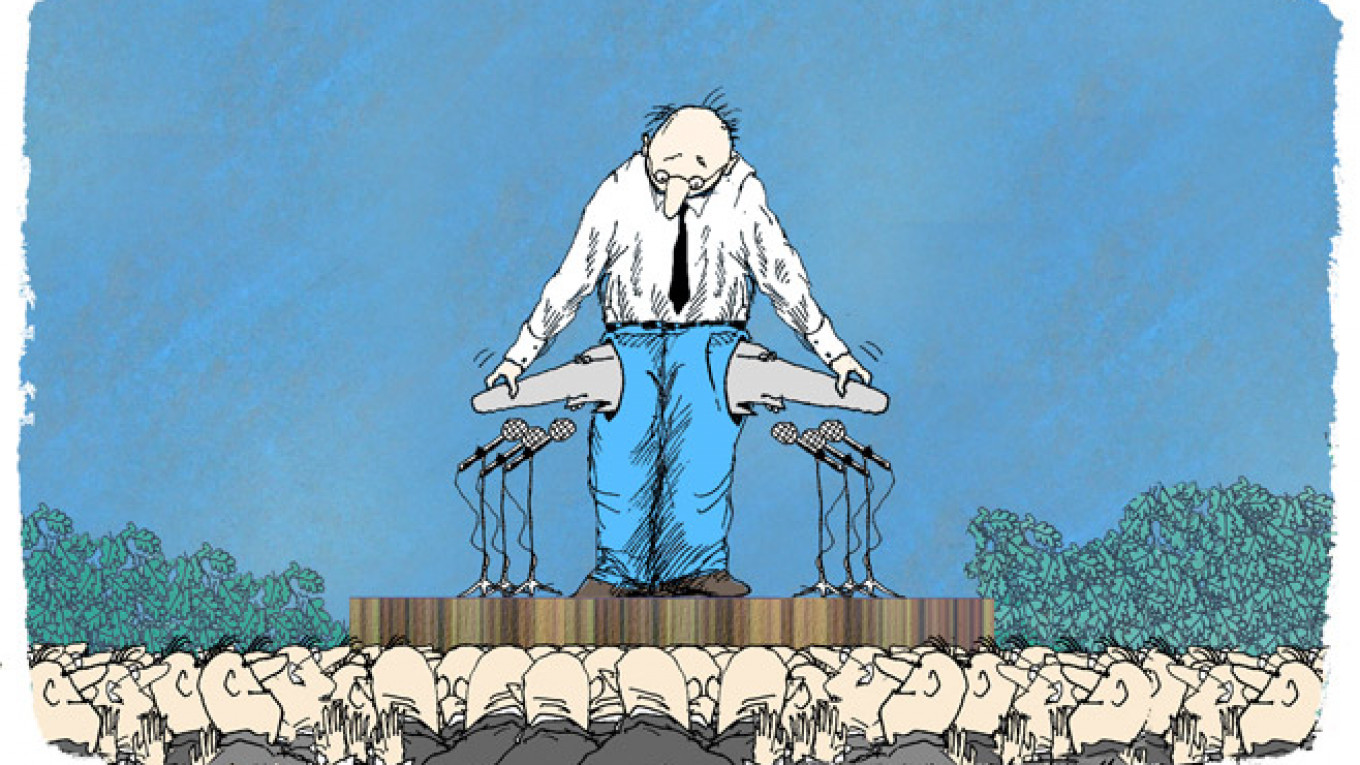Former U. S. President Bill Clinton famously won the first of his two terms in the White House with the slogan: "It's the economy, stupid." At the start of the 1992 election campaign, his victory was unexpected. That was because George H. W. Bush had just presided over what was deemed a successful war against Iraq and the boost to national pride was expected to carry him safely into a second term. But the incumbent president discovered that national pride only went so far. In the end, what people really cared about is whether their lives were improving or not. They cared mostly about the price of food and other goods and how secure their jobs are and prospects for the future were.
Putin can't hold on to the Crimea euphoria forever. He will face serious political problems if inflation rises, disposable incomes fall and employment prospects worsen.
The lesson that Bush learned in November 1992 is one that other leaders have paid close heed to since. It is also one of the important reasons why over the past two weeks there have been conciliatory statements from the Kremlin concerning the crisis in eastern Ukraine and the relatively soft line approach. The lesson of November 1992 is also one of the reasons why the leading candidate for the Ukrainian presidential election on Sunday is Petro Poroshenko, who favors a strategy of engagement rather than confrontation with Moscow. The economic impact of a deeper confrontation with Russia is also one of the reasons why core European Union countries are more intent on de-escalating tensions with Russia than in extending sanctions.
Political jingoism and short, successful military excursions can drive the "feel-good" factor for some time, but only a healthy economy sustains a high popular rating for incumbent leaders and gets them safely re-elected.
It is far too early, of course, for any sense of complacency over the Ukrainian crisis, or to expect investment flows to Russia to pick up. Investors and business leaders will likely stick to a strategy of prudent observance for many months ahead to make sure there is no further spark for political or sanctions risk. It will take a couple of quarters to accurately assess the damage already inflicted on the economy, and the government faces extremely difficult challenges in such areas as inflation control and how to reverse the high volume of capital flight reported so far this year.
But it is the pragmatism of Poroshenko which offers a lot of hope that political risks will be lowered between Moscow and Kiev and between Russia and the EU. Otherwise, continued belligerency between Russia and Ukraine would make it difficult to repair relations with Brussels and to restore investor and business confidence. The next president of Ukraine will certainly inherit a huge array of problems and the most difficult challenge is expected to be restoring domestic political unity. The self-empowered protesters on Maidan Square are unlikely to leave just because there is a newly elected president, and the separatists in the eastern regions of Ukraine will expect negotiations to bring some measure of autonomy to the region.
The economic challenges are also huge but perhaps more manageable given a sufficient volume of external financial aid and a deal with Moscow over gas and trade. Because of the disruption of the past six months, Ukraine is facing a decline in gross domestic product of about 5 percent this year, and unemployment may easily rise toward 10 percent. The collapse in the currency means that inflation is also rising fast and could reach 10 percent in the second half of the year. The longer such issues as the gas dispute and trade relations with Russia remain unresolved, the greater will be the deterioration in the macro indicators and the higher the total bailout package required.
The IMF has so far dispersed $3.2 billion of the promised $17 billion aid deal, with the balance to be dispersed over the next two years on the condition that the Kiev government meets the austerity measures agreed. Another $10 billion is expected to come from the EU and other countries. But the total amount of aid, about $27 billion, is unlikely to be enough to cover all of Kiev's obligations and also allow sufficient resources to reboot the economy. If the political standoff in the eastern regions is not resolved quickly or if the new president cannot get national support for the IMF's austerity program, the bailout package will be insufficient to save the economy. The aid package will also not be enough if trade with Russia, which in 2013 accounted for over a quarter of the value of Ukraine's exports, continues to be disrupted. In addition, the budget deficit, now expected to be close to 8 percent of GDP this year, would certainly also expand and push up the total size of the financial rescue required.
But if the new leadership in Kiev can restore political unity and can reach at least a pragmatic trade deal with Moscow, it has a fighting chance of returning the economy to modest growth in 2015. Ukraine still has the possibility of being one of the fastest growth areas in Europe by the end of the decade, but only if the new president can sort out the politics. But he will need greater economic predictability and a sufficient aid package, and that requires a gas and trade deal with Moscow.
Meanwhile in Russia, President Vladimir Putin enjoys huge popular support and national unity, economic growth is still positive, and financial resources, thanks to high oil prices, means that the country is not facing any great external financial pressure. But while Ukraine's situation is currently very bad but should get better, Russia's currently net positive situation is in danger of getting worse. This could happen if a political standoff with the EU were to worsen or if the West ratchets up its sanction against the larger Russian economy.
Russia's emerging middle class is no different from its equivalent in Ukraine or the West. Yes, they support strong geopolitical statements and actions and cheer their government in times of international crisis. That is normal. But this enthusiasm will quickly fade if inflation rises, disposable incomes fall and employment prospects worsen.
It is a lesson that Clinton understood very well in 1992, and 22 years later it is a lesson that Russia's leaders should take into consideration. At least investors and business leaders hope they will.
Chris Weafer is senior partner with Macro Advisory, a consultancy advising macro hedge funds and foreign companies looking at investment opportunities in Russia.
A Message from The Moscow Times:
Dear readers,
We are facing unprecedented challenges. Russia's Prosecutor General's Office has designated The Moscow Times as an "undesirable" organization, criminalizing our work and putting our staff at risk of prosecution. This follows our earlier unjust labeling as a "foreign agent."
These actions are direct attempts to silence independent journalism in Russia. The authorities claim our work "discredits the decisions of the Russian leadership." We see things differently: we strive to provide accurate, unbiased reporting on Russia.
We, the journalists of The Moscow Times, refuse to be silenced. But to continue our work, we need your help.
Your support, no matter how small, makes a world of difference. If you can, please support us monthly starting from just $2. It's quick to set up, and every contribution makes a significant impact.
By supporting The Moscow Times, you're defending open, independent journalism in the face of repression. Thank you for standing with us.
Remind me later.








